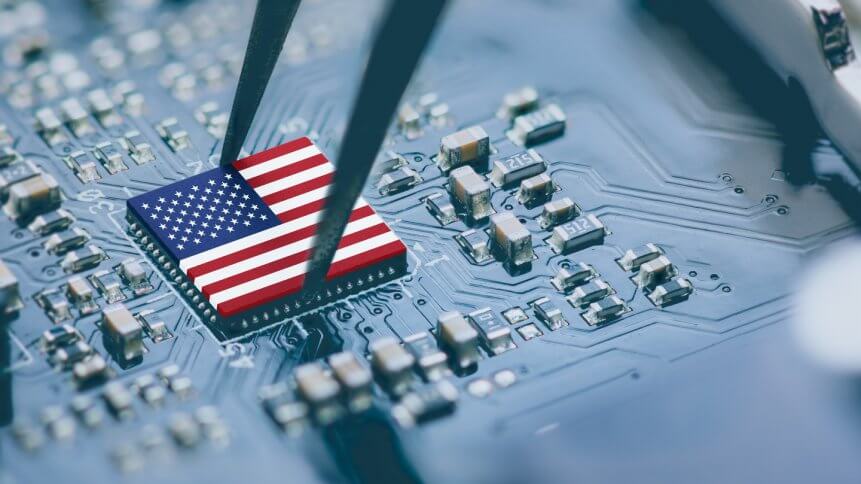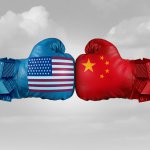New AI Chips Rule Further Sours US Tech Sales

It’s often said that politics is what happens while you’re trying to do business, and American chipmakers AMD and Nvidia have been caught in the middle of a sudden intensification of political hostility between the US and China. Shares in both companies fell in value – 6.6% for Nvidia and 3.7% for AMD – as the result of a new US government rule over the use of AI and machine learning chips.
The new rule requires a fresh licence (effective immediately), to address the potential use of chips exported to China being “used in, or diverted to a ‘military end use’…in China and Russia.”
While AMD, which launched its new generation of CPUs in late August, and expects to start shipping them by the warehouse-load by October, said the new license requirement would have little to no material effect on its business beyond the hopefully-brief share price drop, Nvidia said the new rules would affect around $400m (£345.2m) in sales to China could be affected “if customers do not want to purchase the company’s alternative product offerings or if the (US government) does not grant licenses in a timely manner or denies licenses to significant customers.”
Both chipmakers stopped supplying Russia directly shortly after the illegal invasion of Ukraine. But the change will make good political capital for the Biden administration, which despite landmark achievements like the Chips Act, is struggling to be seen as doing anything of emotional significance to blue collar American workers ahead of the midterm elections in November, which could see the make-up of government change radically.
The Cost of Bureaucracy
Meanwhile, Nvidia may struggle to get the Chinese market to accept alternatives to its A100 and H100 chips, which are designed to speed up machine learning tasks and the systems which include them, especially if the giant governmental bureaucracy tasked with issuing licensed should in any way find itself slowed down by the new requirements.
In a move that surprises literally no-one, Beijing has decried the new licensing requirement. “The US side should immediately stop its wrongdoing, treat companies from all over the world including Chinese companies fairly, and do more things that are conducive to the stability of the world economy,” the government said. That will cut little ice in the US, given China’s own recent drift towards economic protectionism.
A US Commerce Department told the UK’s BBC News that “We are taking a comprehensive approach to implement additional actions necessary related to technologies, end-uses, and end-users to protect US national security and foreign policy interests. This includes preventing China’s acquisition and use of US technology in the context of its military-civil fusion program to fuel its military modernization efforts, conduct human rights abuses, and enable other malign activities.”
The Trouble With AI
This is an area in which AI and machine learning as a sector becomes troublesome, because the power of AI as a technology lies in its ability to do anything you train it to, from diagnosing rare diseases to more accurately killing the people you want to kill. Enforcing a permissions regime on chipmakers will at the very least slow down production and distribution of chips, as manufacturers like Nvidia have to engage in research as to what purposes, and for whom, their chips might be used. In particular, the vagueness of the wording in the new rules – “used in, or diverted to a ‘military end use’…in China and Russia” – seems to argue against any speculative use case. After all, when a chip is designed to speed up machine learning, the likelihood that it could be “diverted” to a military end use is fairly high – the US military uses such machine learning chips in a whole variety of ways itself.
The US Democratic party has stiffened its line against China’s technological and political claims to supremacy in recent months – US Speaker of the House, Nancy Pelosi recently visited Taiwan, a nation claimed by China to be part of its country, in spite of Taiwanese rejection of such claims. While the trip was widely seen as reckless and contributing to the deepening political rift between the two superpowers, it’s unlikely the visit would have taken place has it been counter to the Biden administration’s plan to look tough, both on the world stage and to potential swing voters in November.
It’s also worth noting that the move is entirely unlikely to put Nvidia in financial trouble – the company’s data center business has boomed by 61% in the last year.
Meanwhile, away from chipmakers and their woes, there are still major technology deals being struck between US and Chinese firms – just last week, ByteDance, the Chinese company behind TikTok, and Microsoft, the US company behind almost everything else, united to work on a project called Ray, which, with what might feel like a particularly bitter irony to Nvidia, will help companies run AI apps more efficiently.










